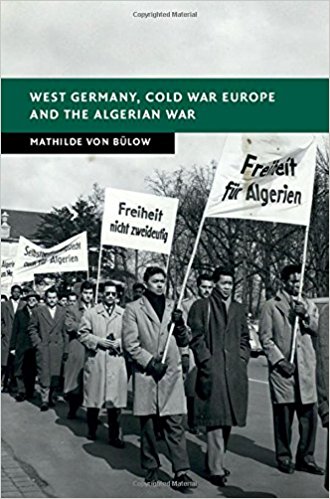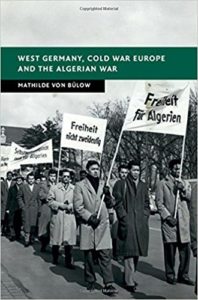
 In November 1958, a young man and woman came under fire while entering the Tunisian embassy. The woman vanished in the following chaos, but the young man collapsed, gravely injured. Mathilde von Bülow begins her engaging monograph with this account of a French assassination attempt on a Front de Libération Nationale (FLN) member in West Germany. The FLN, founded in 1954, sought to push the colonial French regime out of Algeria, a goal which they would achieve in 1962 after a long, bloody war for independence. Where most scholarship examining the war focuses on the French and Algerian combatants, von Bülow deftly weaves together a complex picture of how the war extended beyond Algerian and French boarders into West Germany.fright
In November 1958, a young man and woman came under fire while entering the Tunisian embassy. The woman vanished in the following chaos, but the young man collapsed, gravely injured. Mathilde von Bülow begins her engaging monograph with this account of a French assassination attempt on a Front de Libération Nationale (FLN) member in West Germany. The FLN, founded in 1954, sought to push the colonial French regime out of Algeria, a goal which they would achieve in 1962 after a long, bloody war for independence. Where most scholarship examining the war focuses on the French and Algerian combatants, von Bülow deftly weaves together a complex picture of how the war extended beyond Algerian and French boarders into West Germany.fright
Through her book, based on her Cambridge dissertation, Mathilde von Bülow, a lecturer at the University of Glasgow, has provided readers with a well-researched volume demonstrating the rarely acknowledged importance of West Germany in the French-Algerian War (1954-1962). Von Bülow informs her readers that this book explores “transnational movements and civil-society actors in international relations” (23), but she does much more than that. Working with French, German, and English language sources, she demonstrates the complex and often lethal relationship between the West German, French, and Algerian states. Part of a recent branch of scholarship exploring West Germany beyond the East-West divide, von Bülow deftly demonstrates that the Cold War was a global conflict, which influenced independence movement and decolonial projects. By showcasing West German involvement in the French-Algerian War, von Bülow further highlights the interconnection between West Germany’s eventual support for humanitarian efforts as well as the early development of the West German discriminatory immigration politics.
Von Bülow’s book is divided into three sections with a total of ten chapters organized chronologically. The first chapter, “Creating Sanctuary,” describes the opening of the French-Algerian war. Continuing that thread neatly in Part I, the author examines French-Algerian and West German diplomacy and policy from November 1954 through May 1958, demonstrating why the FLN choose to use the Federal Republic (FRG) as a sanctuary. In one of the main threads of this part, von Bülow examines how the West German state dealt with its somewhat inadvertent involvement in the French-Algerian conflict as it tried to rebuild its relationship with France after the Second World War. With the French continuing to charge the Federal Republic with “meddling” in North Africa even as the FLN and its Third World allies criticized the FRG’s behavior, the government under Christian Democratic Konrad Adenauer had to choose its sides (75). Although attempting “acrobatic” balancing acts to appear not to choose sides, von Bülow clearly demonstrates how and why the Adenauer government sided with the French, even as the state criticized what diplomat Paul Frank called “obsolete and narrow minded colonialism” (74). The allure of the Treaty of Rome (establishing the European Economic Union) was simply too great for the Adenauer government to resist. More than Third World allies, Adenauer wanted West Germany to “emerge as an equal and sovereign partner” (152) on the European stage.
Although the book focuses on the French and West German governments, it is not only a story of French-German relations. Von Bülow also highlights the FLN’s brilliant international diplomacy and propaganda. She demonstrates why and how, despite the West German government’s clear siding with the French state, the FLN used the Federal Republic as a stage for sanctuary and increasingly for action. In a theme that she continues throughout the book, von Bülow shows how the FLN used West German and French law to its advantage. Furthermore, to this reviewer’s delight, von Bülow demonstrates how legal categories and recognition directly impacts an individual’s rights and freedoms. Among other moves, FLN members took advantage of their status as French citizens to move with relative freedom in West Germany. Responding to that movement, the French government pressed the West German government to survey and repress all ethnic Algerians in the country, while attempting to use the press to draw attention to FLN atrocities. The FLN, in turn, turned French bombings and “gestapo-style methods” (111) against them, drawing on popular West German sympathy. Following the French lead, the West German state did try to crack down on FLN’s “public relations activities” (109), but the FLN members deftly used West German law regarding publishing and private gatherings to their favor. In consequence, even as the Adenauer government continued to support the French counterinsurgency and pressed NATO allies to do the same, the West German press took an increasingly anti-colonialist tone. By the time the Fourth French Republic collapsed in May 1958, the FLN had an established base in West Germany, which it was using to move contraband (often guns procured through private arms dealers) and draw on international support.
Part II analyzes the FLN’s use of West Germany with the founding of the Fifth Republic until December 1960. In the “diplomatic war,” the author tells the story of how, in the crises the West German state chose to side with the French, even as the FLN opted to use West Germany as a sanctuary rather than recognize East Germany in a complex “balance and blackmail” to achieve its goals. Chapter 7, “the intelligence war,” shows how West German ties to France now enabled the French to export a “colonial ‘policy of complete human management and control’” (189). It is here that readers see the early development of the Rechtsstaat mentality Chancellor Willy Brandt would turn to in 1972 after the Munich Massacre. Although in the late 1950s the West German government hardly implemented the level of security later decades would see, the state began implementing clearly discriminatory policies targeting Third World immigrants through the requirement of “blue cards” for work and residency visas as well as the prohibition on political engagement.
Chapter 8, in contrast, focuses on the “propaganda war” and the battl[e] for the West German public’s “hearts and minds” (226). Here, von Bülow demonstrates a growing split in popular West German support for the FLN—and increasingly for humanitarian action in the Third World—in contrast with a government that continued to predominately back French interests. The French deuxième bureau would blame that divide on the lack of “French information on the Algerian problem” (245). Regardless, “West German civil-society actors” collaborated with public and clandestine FLN networks to send humanitarian aid as well as weapons to Morocco and Algeria. As chapter 9 demonstrates, that recruitment and an arms build-up led to a “war of action.” Attempting to halt the FLN’s procurement of war materials, the French opted to violate West German sovereignty with a series of planned homicides. Those violations “unleashed a torrent of speculation” in the press (307). The resultant stories about a mysterious “Red Hand” (309), supposedly a group of French settler communities in North Africa that did not in fact exist, allowed the French government to cover up its role in the West German violence and, in turn, push the West German government to greater heights of targeted surveillance. The public outcome of the violation of territorial rights and heavy-handed methods was the widespread view of the French government as a kind of boogeyman. Furthermore, responding to French colonial tactics, multiple Second and Third World governments opted to take the place of private arms dealers (321). It is here that this reviewer will mention a minor critique: the author is so immersed – rightly so – in her own text that she neglects broader changes within West Germany politics and foreign policy. That critique is hesitantly written, however, as the author more than fulfills her promised goals.
Looking at the end of the war, part III changes focus, turning toward the assertion of both West German and Algerian sovereignty. In a single chapter that behaves largely like an epilogue, von Bülow shows how the two states used one another in their bids for global recognition. Through the book, von Bülow pointed toward the complexities of West Germany’s global position and “competition [with East Germany] for recognition” (338). Here, von Bülow demonstrates why the new Algerian state chose to recognize the West over the East, in part due to the “chequebook diplomacy” of humanitarian aid (350). The West’s ability to wield soft power through money and technological know-how was attractive, even as Algeria drew on the Soviet model for state development. Nonetheless, as von Bülow’s conclusion emphasizes, even as the West German government began emphasizing humanitarian aid, its past support of the French had already led toward its development as a police state. Under French pressure, the West German state had incorporated policies leading toward the “militarization” of policing and mass incarceration, particularly of migrants from across North Africa.
This book is highly recommended for scholars interested in Cold War and Decolonial History. It expects, however, too much prior-knowledge to serve a general audience or a low-level undergraduate course. Instead, it serves as an important corrective to the West-East Germany story of the Cold War that many scholars have limited themselves. Eminently readable, the book comes as close to an engaging spy novel as a historical monograph can. Von Bülow’s talented writing builds a constant tension and intrigue that draw the reader onward.
Reviewed by Brittany Lehman, College of Charleston
West Germany, Cold War Europe and the Algerian War
by Mathilde Von Bülow
Publisher: Cambridge University Press
Hardcover / 466 page / 2016
ISBN: 9781107088597
To read more book reviews, please click here.
Published on April 4, 2017.




